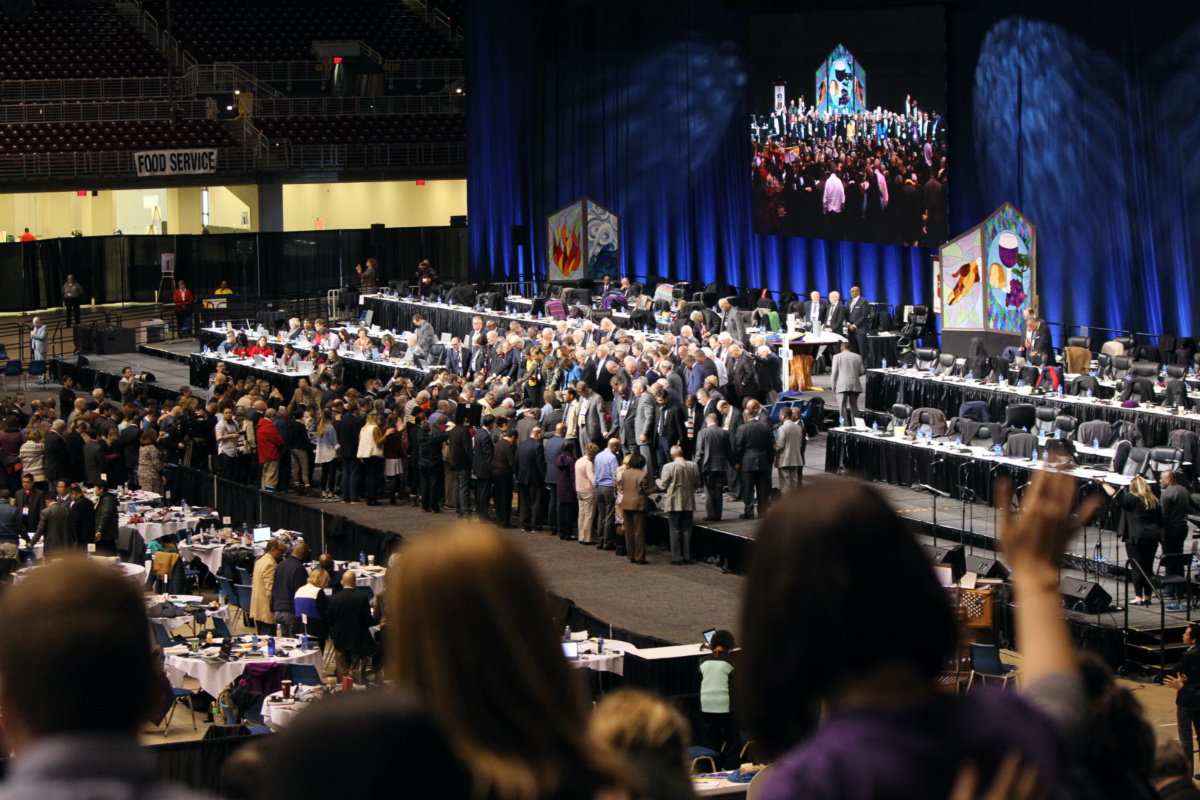
JACOB LUPFER, in an article published on Religion News Service, says that most laity and many clergy are not nearly so invested in moving the Methodist divorce along as those at the extremes…
Via RNS
Nearly three years after the United Methodist Church formally acknowledged its impending schism, few in America’s second-largest Protestant denomination, outside a relatively small circle of elites, appear to have an appetite for splitting.
Divorce is the most played-out metaphor for the coming UMC split. But if mom and dad are sleeping in separate rooms, that fact is being met with a shrug by kids who, at least for now, do not care to notice.

United Methodist bishops and delegates gather together to pray at the front of the stage before a key vote on church policies about homosexuality on 26th February, 2019, during the special session of the General Conference of The United Methodist Church, held in St Louis, Missouri, US. PICTURE: RNS/Kit Doyle.
In any ecclesial conflict there are non-combatants who don’t really understand what all the fighting is about. But in this case particularly, the muddling Methodist middle that has historically tempered the impulses of extremists is indifferent to the impending schism. Most laity and many clergy are not nearly so invested in moving the Methodist divorce along as those at the extremes.
In January 2020, stakeholders announced a protocol for separation that would allow congregations to leave the UMC and unite in new denominations, committing $US25 million to form traditionalist Methodist denominations, including the Global Methodist Church. This arrangement was expected to be approved by a denominational vote later that summer – until COVID-19 happened.
“With the compromise agreed to, however, bitter infighting broke out during the pandemic over when, or even whether, to hold the postponed General Conference. At this point the protocol is far less certain to come off today than it was 18 months ago. Activists on both sides assure me that the split is certain to happen but privately express doubt about how or when.”
With the compromise agreed to, however, bitter infighting broke out during the pandemic over when, or even whether, to hold the postponed General Conference. At this point the protocol is far less certain to come off today than it was 18 months ago. Activists on both sides assure me that the split is certain to happen but privately express doubt about how or when.
There is also the complexity of splitting the worldly goods: United Methodism is a global denomination united by a commitment to the theology of Methodism’s founder, John Wesley – but also by a complex polity and a connected web of institutions and financial commitments.
It is likely that most United Methodists can, and might prefer to, live in the ambiguity of a diverse global denomination in which some congregations welcome same-sex unions and openly LGBTQ ministers while others do not. Most Methodists see their church as a group of like-minded believers organized around the ordered worship of Almighty God, the administration of sacraments and rites, serving their communities and promoting piety and devotion through prayer, song, and Scripture reading.
Carl Sandburg’s famous lines from a 1939 poem come to mind: “Someday they’ll give a war and nobody will come.”
What if the UMC gave a schism and nobody came?
But after all, the schism is real. American Methodists on the right have railed for decades against political and theological liberalism in the General Church – the UMC term for “connectional ministries”: the boards and agencies that advance the denomination’s educational, evangelistic and programmatic missions. Some of the most conservative are clear that they believe progressives are not Christians at all, and they do see the UMC as a spouse they’ve hated for more years than they ever loved.
And allowing the protocol to twist in the wind has its own rotting effects. Both sides harbor visceral but mostly unstated fears: Liberals worry they will inherit a dying yet still expensive church bureaucracy with fewer members to support it. The new, conservative GMC could wind up ecumenically isolated, known more for its anti-gay views than its muscular Wesleyan distinctives. These outcomes are more likely to materialise if the conflict-averse laypeople and a large subset of clergy don’t grasp the schism’s necessity.
If the two factions want their constituents to understand what is really at stake, they need to talk less like family therapists arranging a conscious uncoupling and more like generals conscripting reluctant combatants into war.
We rely on our readers to fund Sight's work - become a financial supporter today!
For more information, head to our Subscriber's page.
United Methodists have so much moderation and niceness in their spiritual DNA that it may feel unnatural to speak in such strong terms. But without a more robust call to arms, United Methodism could well continue as a dysfunctional marriage.
The Council of Bishops, which is dominated by liberals but includes bishops who would leave if they could, held a virtual meeting on 2nd to 5th November to discuss the future.
A letter circulating this week, entitled “A Call to Grace,” is gaining steam. It asks bishops to allow conservatives to leave without waiting for the next General Conference or its increasingly uncertain separation-protocol legislation.
In divorce and in battle, there is always collateral damage and rampant, tragic brokenness. But a war of attrition while the paychecks keep cashing and the pensions keep vesting is not peaceful, conciliatory or therapeutic in any meaningful way.
The denomination is trapped by its own Book of Discipline, ever the strength and the weakness of United Methodism itself. Maybe it was always going to end this way. Or maybe it does not end at all.
Jacob Lupfer is a writer in Jacksonville, Florida.






